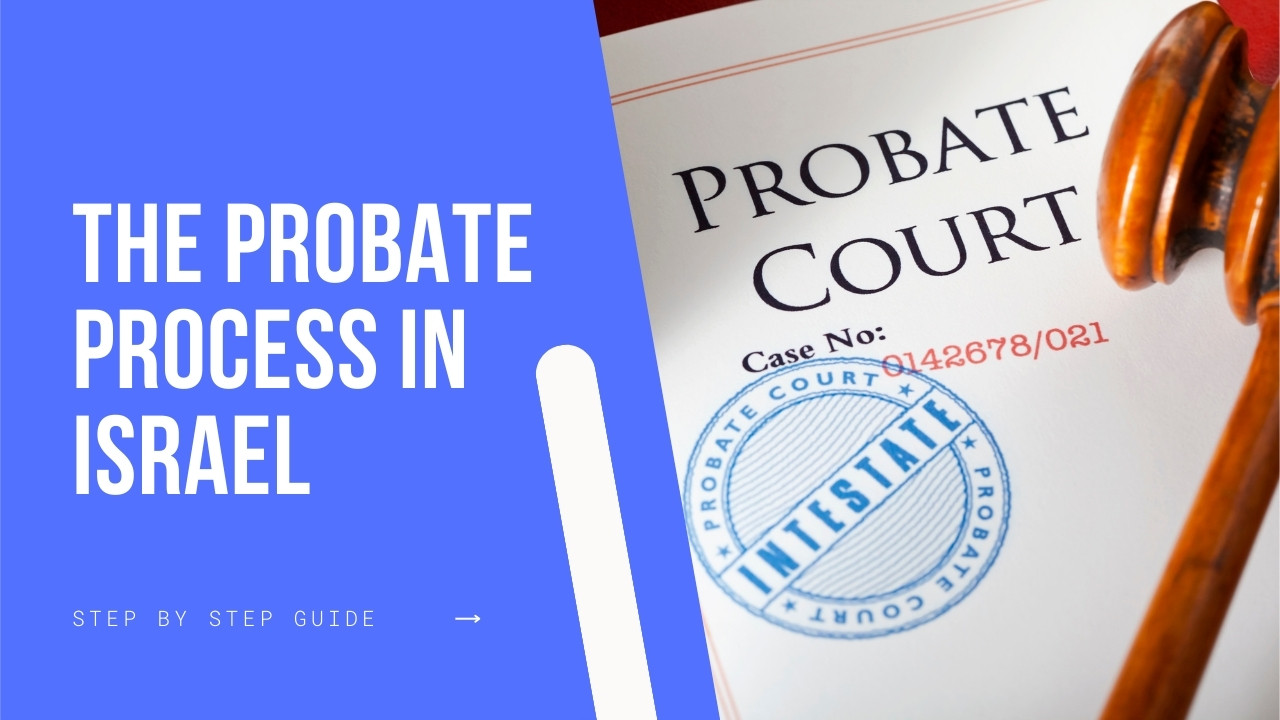The probate or administration process of any estate in Israel can take anywhere from four to six months, and in some cases, it can take up to a year, depending on the complexity and nature of the case. We finalize 90% of our cases very quickly between four and six months.
The exact time frame depends on several factors, including:
- Intestacy: If the deceased did not leave a will, there is a diligent process that needs to be followed by the court in Israel.
- Complexity: The presence of a foreign trust, amendments, or codicils may prolong the process.
- Authenticity: Having the original will is the best. Having a copy is also acceptable, but a special motion will need to be filed in the absence of the original.
- The Inventory of the Estate: Estates with significant assets will naturally take longer to finalize.
- Validity: The presence of a clear will without errors, typos, omissions, lack of identification or Social Security number, etc. can hold things up.
- Court’s Schedule/Backlog: The court system’s workload can impact how quickly an estate inheritance case gets addressed, especially since Israel has many holidays.
- Objection or Contesting an Estate among Heirs: Any dispute between beneficiaries can lead to litigation in Israeli family court.
How Long Does A Probate Process Take In Israel?
In most estates, we complete the probate processes in Israel very quickly. If a deceased person passes away in Israel, the estate can usually be finalized in approximately two or three months. If the deceased passed away outside of Israel, you can expect the probate process to take 4-6 months, but it wouldn’t be uncommon for it to take longer. We strive to keep the process simple and expedite it as much as possible. Please feel free to reach out to us over the phone or submit our online form so we can answer all your questions.
What if a Person Passed on Outside of Israel?
If an individual passes on outside of the State of Israel and leaves Israeli financial assets or property to their heirs, Israeli law mandates that a foreign legal opinion be submitted to the family court. This opinion, a crucial step in the process, is typically obtained by engaging a legal expert in the country where the deceased resided, who will review the relevant laws and precedents and provide an opinion on their compatibility with Israeli inheritance law.
As an example, if a California resident who owned an apartment in Tel Aviv passes away and leaves the apartment to his/her heirs, it will be necessary to provide the Israeli court with a legal opinion. This opinion should state that California law does not conflict with Israeli inheritance law and that Israeli inheritance law will apply to the probate and transfer of Israeli real estate owned by the CA resident. The legal opinion should include relevant statutes and the most recent California precedents.
It is crucial to note that a US or foreign legal opinion prepared by an objective expert acceptable to the Israeli family probate court is required. This opinion must demonstrate the coexistence of foreign law and Israeli inheritance law.
Is The U.S. or Any Foreign Will Valid In Israel?
The answer is yes. An American will or any foreign will can be valid and executed in Israel. The will must first be translated into Hebrew by a certified translator, but rest assured, your foreign will is recognized in Israel.
What about a U.S. Trust from any American State?
The US trust provisions need to be fulfilled according to the last wish of the testator. In many cases, the U.S. trust is used as an instrument by the testator to bypass any possible estate tax in the US and/or to bypass a probate.
In Israel, we do not have an estate, death, inheritance, or succession tax, and probate cannot be bypassed in the state of Israel.
We keep it simple, and we speed up the probate process in Israel.
How To Successfully Complete A Probate In Israel?
Upon an individual’s death – whether in Israel or outside of Israel – the fate of their property must be decided through a probate process. Inheritance is the universal practice of passing on property, rights, obligations, and debts to heirs. Although the practice appears in some form in all cultures, the rules of inheritance in Israel are subject to the jurisdiction where the deceased died or owned property at the time of their death in Israel.
The Succession Law of 1965 in Israel (‘Succession Law’) governs inheritance in Israel. Furthermore, the Israeli courts gain jurisdiction over the estate of any person who, at the time of his or her death, was a resident of Israel OR who left ANY property in Israel. Inheritance in Israel may occur through a probate process in one of two ways: by will or by law – called “intestate” where there is no will.
The fundamental principle of inheritance is that people are free to distribute their property as they see fit. A will expresses a person’s wishes regarding their affairs upon their death. Therefore, Israeli Succession Law is contingent upon the existence of a will. A valid will overrides the default stipulations of the law regarding the identity of the heirs and the distribution of the estate. It is a binding legal document incumbent on all parties.
In Israel, a will is not subject to obsolescence, and there is no limit to the number of wills a person may create. However, it must be stipulated that the final will (chronologically) is the deciding one (in most cases) and will override any former, older wills – unless the ‘new will’ is faulty to the point of unlawfulness as decided by a family court in Israel.
When an heir or trustee wishes to execute a will in Israel, they must present it through a probate court order granted by the Israeli Inheritance Registrar and Family Court. This order validates the wish of the testator and has the same binding legal status as any court judgment or decree, as stipulated in the will or trust.
The presentation of a petition for a Probate Court order is publicized in a local newspaper to allow for any objections to the will to be made by possible creditors.
A separate filing fee must be paid to the Israel Inheritance Registrar.
A Petition For An Israeli Probate Court Order Must Include The Following Checklist
Filing Fees
There are Two Filing fees – one for the petition and one for the publication.
Proof of payment of the government levy is required upon submitting a petition. This is done quickly online. As of 2024, the fee is NIS 721 for both.
A Probate Court Order Petition
A Probate Court Order petition must be signed by the petitioner and verified by your attorney.
An Original Death Certificate with an Apostille from the State of the Testator
An original death certificate must accompany the petition. If the deceased passed away in a foreign country, an Apostille is needed.
The death certificate does not need to be translated; it is only attached with an Apostille from the specific state in which it was issued.
The Original Will
The original must be physically submitted at the time of filing the petition. If there is no original will, a motion explaining why the original was not submitted must be submitted, as well as proof of payment of the government levy for the specific motion.
In any Estate of a Foreign deceased, a Foreign Legal Opinion (FLO) on the Domicile Law of the Testator is mandatory.
This opinion simplifies the details of foreign law, specifically the domicile law of the deceased, for the Israeli judge, ensuring a smooth probate process.
In most estates and jurisdictions, the domicile law does not conflict with the Israeli Succession Law. However, in some estates, there is a conflict, in which case an FLO needs to be submitted to simplify the details of foreign law, also known as the domicile law of the deceased, for the Israeli judge.
In some states in the US, the distribution of the funds is different from Israeli Inheritance law; therefore, the Israeli court needs to adapt to the domicile of the testator regardless of whether a will exists or not.
The Law Requires a Notice of Service to All Heirs
Notices of service must be made to all heirs, notifying them of the Probate Order petition. Confirmation of the filing must be made by registered mail and must be filed with the court. An affidavit by your attorney can be substituted for the registered mail.
An heir who seeks to execute a probate or Administration online will have to do so by an attorney. After the submission, the attorney will have to provide within seven days a hard copy of the original will and the approval of the online petition to the Inheritance Registrar Bureau.
If the deceased’s residence was not in Israel, alongside the aforementioned documents, the petition must include additional documents, including proof of the existence of assets (such as the proof of ownership from a Land Registrar, etc.).
Contact Our Firm For a Complimentary Consultation
We keep it simple and fast by saving you precious time in finalizing the probate process in Israel.
We represent international clients from the United States, Canada, the UK, Europe, and Israel. We have an excellent track record with many satisfied clients. We maintain offices in Israel and three locations in the United States (Florida, New York, and Los Angeles).
To contact us from the U.S., please call 888-923-0022. Our head office in Tel Aviv, Israel, can be reached at (972) 3.9055478 or (972) 50.7322688. Please feel free to call us to schedule a complimentary consultation, and we will demonstrate how we can expedite the process.



Hello,
I am looking to probate my father’s will in Israel. He was domiciled in the US when he passed. How much does it generally cost to probate this will? Thank you.
Jennifer
Hello Jennifer,
Thank you for taking the time to reach out to us!
Please call us at (888) 923-0022 , and we will explain the process along with all necessary details.
Best,
Aharoni Law Offices